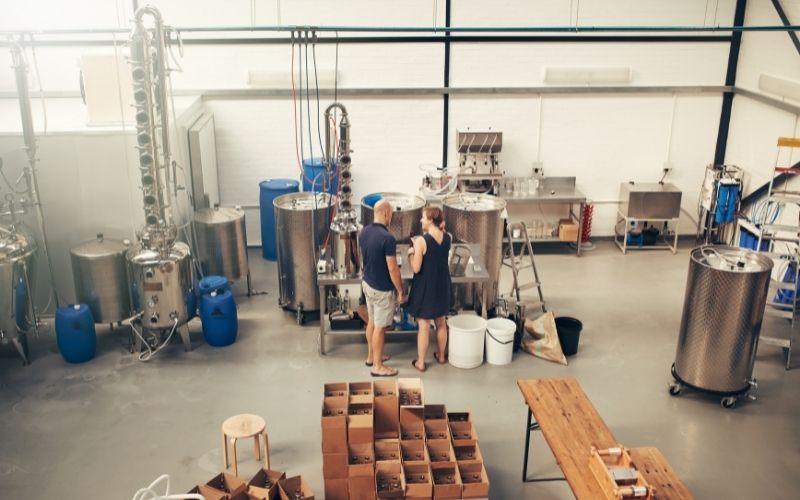
The Curious History of Gin: Origin, Popularity, Other Facts


The history of gin is not well known by many. And yet, it has been around for centuries and is loved by millions of people worldwide. Some say it's because this liquor tastes good, but others believe gin's history is full of mystery and intrigue.
In this blog post, we’ll explore gin’s origins and why so many people love it today. Plus, we’ll let you in with some well-known brands of gin and classic cocktail mixtures!
In the history of gin, there is a lot to be said. Most people believe that a Dutch doctor invented it in the 16th or 17th century as medicine for his patients.
However, others say this may not have been true, and it was simply used as an excuse because alcohol had previously been banned by laws throughout Europe from 1432 until 1573 when King Henry VIII lifted these rules on certain days of the week.
Historians know that its origins were recorded during this time, which means somewhere between those years is where it all began!
The popularity of gin exploded in the Netherlands and was exported to England, where it was highly successful. The English preferred an alternative for brandy from France, who at that time were their enemy.
The "Gin Craze" swept through England during the beginning of the 18th century, resulting in a significant rise in gin's popularity. Fifteen thousand drinking establishments were set up throughout England to supply this rapidly growing trend.

Despite being popular in the UK, gin was introduced to America when it became a favorite among all classes of people until other spirits like whisky and vodka came into fashion during the 20th century.
In recent times, the traditional gin distillate has made popular culture come back due to younger generations' growing appreciation for juniper flavors. Today, it can be ordered almost anywhere!
So, it can be said that the history of gin continues to be written today, with new flavors and variations popping up in bars all over the world.
The taste of different types of gin can range from subtle to challenging. The main ingredient is juniper berries, but the styles are still differentiated by ingredients added during distilling. Here are some varieties of gin you can enjoy.
London dry gin is often dominated by citrus flavors and the taste of juniper berries. It's not necessarily coming from London, but based on a popular style, it is often considered to have those characteristics.
American gin is a modern style that includes lots of gins made in the USA. This type isn't specific to one flavor, but it's more based on where the drink comes from rather than what goes into making it.
Plymouth gin, previously only made in Plymouth, England, by local artisans, is now produced all over the United Kingdom and America.
It has a distinct taste that's full of botanical ingredients but mellow, making it an easy type to drink for people who don't like intense flavors or alcohol in general!
Genever is also known as “Holland gin” because it originally comes from the Netherlands. It has a sweeter taste than other gins, with its flavors being more herbal rather than fruity.
Old Tom Gin is a sweeter version of London Dry. But unlike its counterpart, it contains sugar syrup and has citrus flavors. It was once rare in the UK but nowadays can be found in most bars with well-equipped facilities.
There are several brands that you can choose to try out. Some well-known ones include Tanqueray, Beefeater, and Bombay Sapphire.

Beefeater is an award-winning, classic gin that’s accessible and affordable. It produces a smooth taste at the right price point for malt lovers worldwide to enjoy their favorite drink in bars and homes alike!

Alongside juniper, the world-famous Bombay Sapphire contains botanicals from countries covering almost every continent. These include lemon peel, coriander, angelica root orris, grains of paradise, cubeb berries, cassia bark almonds, and liquorice.

The Botanist is a gin distilled on the Scottish island of Islay, which uses 22 different types of flowers, fruits, and herbs in every bottle.
The product prides itself on being painstakingly hand-foraged from the remote landscapes by native botanical gatherers trained to identify them correctly.

Roku Gin is named after the traditional Japanese number six. This gin has a unique flavor that sets it apart because of its use of eight botanicals: juniper berry, coriander seed, angelica root, angelica seed, cardamom seeds, cinnamon, and bitter orange peel.

A spicy drink with a difference is Opihr's Spiced London Dry Gin. It should be served on the rocks or neat to taste each botanical used in its production.
It has Indonesian Cubeb berries, Indian black pepper, Moroccan coriander, amongst other ingredients for an original flavor profile that sets it apart from others of its kind.

There are many different gins, but the only brand that sells Plymouth Gin is aptly called "Plymouth." This gin has an earthy flavor and comes in two strengths – standard strength and Navy Strength.

Tanqueray is a gin that’s known for its balance. It doesn't prefer to bring in anything too rogue but instead keeps the crowd happy with subtle flavors of juniper, coriander, angelica root, and liquorice.
Gin is an incredibly versatile spirit that can be mixed with nearly anything. The most famous gin cocktails are the Martini and the Gin Rickey, but they can also contribute to a Tom Collins or Pink Gin.

The classic Martini is a gin cocktail that has countless variations. The simplest one would be your chosen gin and dry white vermouth, equal parts if possible. Garnish with an olive or lemon peel for a fresh aroma!

The gin and tonic is a popular drink with equal parts of dry gin, bitters, simple syrup (or sugar), lime juice, and ice cubes. It can be topped off or mixed in a tall glass filled with ice for serving.

The Tom Collins is a gin-based cocktail that's fun and refreshing. It contains lemon juice, sugar syrup, club soda, or seltzer water mixed with gin.

The French 75 cocktail is a sophisticated gin drink. Its tangy, bubbly, and botanical- citrusy notes are present throughout the recipe, with champagne adding effervescence to this beverage.
This drink makes for an excellent all-occasion cocktail that will have you feeling festive!
Now that you know a little more about gin's history, it’s time to try it for yourself. Maybe you'll find your new favorite drink! Who knows? You might even be able to impress some friends with all of this newfound knowledge.
Let us know what you think in the comments section below - we would love to hear from our readers.

